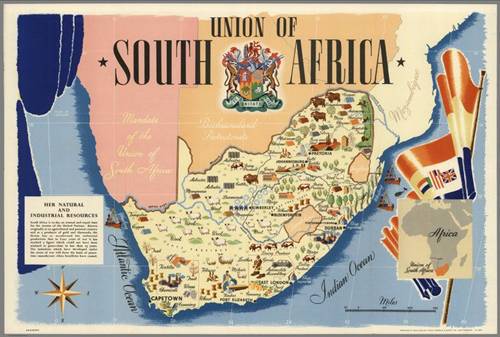 A map representing the ‘new’ Union of South Africa of 1956 (The British Cape Colony and the two Boer Republics: The Transvaal and the Orange Free State). Image Source: https://alchetron.com/Union-of-South-Africa
A map representing the ‘new’ Union of South Africa of 1956 (The British Cape Colony and the two Boer Republics: The Transvaal and the Orange Free State). Image Source: https://alchetron.com/Union-of-South-Africa
Anglicization: The act of Anglicizing, which means to make or become English in form or character.
Bittereinders: This Afrikaans term translates to fighting to the bitter end and directly refers to the Boers who kept fighting the British in the war after the annexation of the Transvaal and Orange Free State.
Boers: Boer is the Dutch or Afrikaans word for “farmer”. In the context of the South African War and Union, “Boer” refers to the descendants of the Dutch/Afrikaans-speaking settlers in southern African during the 18th to early 20th century.
Colonization: The action/process of settling among and establishing control over the indigenous people of an area.
Contingents: A group of people who form a part of a larger group. For example, during the South African War there were numerous Australian soldiers who participated in the war, due to Australia’s colonial ties with the British Crown.
Convention: An agreement between states covering particular matters, especially one less formal than a treaty.
Divergence: A difference in opinions, interests, etc. or the process of a state separating or dividing.
Emancipation: The process of being set free from being someone who is enslaved.
Franchise: An authorization granted by a government or company to an individual or group enabling them to carry out specified commercial activities, for example acting as an agent for a company's products.
Guerilla Warfare: Engagement in or the activities involved in a war fought by small groups of irregular soldiers against typically larger regular forces.
Hensoppers: This is an Afrikaans term that refers to putting one’s “hands up” and is used to describe the Boers that surrendered to the British during the South African War by signing a peace treaty as laid out by Lord Roberts.
Independence: The fact or state of being independent (being able to make their own decisions).
Monopoly: The exclusive possession or control of the supply or trade in a commodity or service.
Rebellion: An act of armed resistance to an established government or leader.
Republic: A state in which supreme power is held by the people and their elected representatives, and which has an elected or nominated president rather than a monarch.
Suzerainty: Is a relationship in which one state or other polity controls the foreign policy and relations of a tributary state, while allowing the tributary state to have internal autonomy. In terms of the South African War, this refers to the British claiming control over the foreign policies of the Boer Republics but allowing them to keep their internal autonomy.
Treaty: A formally concluded and ratified agreement between states.
Trek: A long arduous journey, especially journeys made on foot.
Uitlanders: A British immigrant living in the Transvaal who was denied citizenship by the Boers for cultural and economic reasons.
Verraaiers: This is an Afrikaans word that translates to ‘traitor’. It refers to the Boers who “gave up” their fight in the South African War and decided to join the British soldiers in their fight against the Boers. Most of the Boers who joined the British arms, did so in an attempt to end the war sooner.
Voortrekkers: A member of one of the groups of Dutch-speaking people who migrated by wagon from the Cape Colony into the interior from 1836 onwards, in order to live outside of British Rule.
This article was originally produced for the SAHO classroom by
Ilse Brookes, Amber Fox-Martin & Simone van der Colff